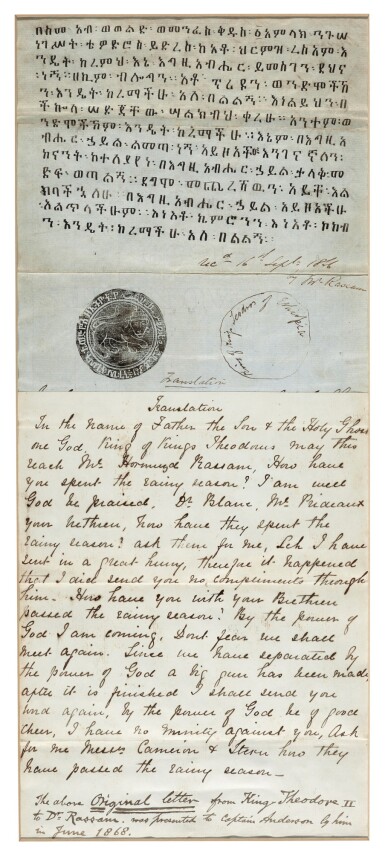Collection of a Connoisseur: History in Manuscript, Part 2
Collection of a Connoisseur: History in Manuscript, Part 2

Theodore II, Emperor of Abyssinia | letter to Hormudz Rassam, with Lion of Judah stamp, 1866
Lot Closed
April 27, 02:51 PM GMT
Estimate
700 - 900 GBP
Lot Details
Description
Theodore II, Emperor of Abyssinia
Letter, to the archaeologist and diplomat Hormudz Rassam
sending compliments to him and his fellow prisoners and asking how they had spent the rainy season, also warning of his military preparations ("...By the power of God I am coming. Don't fear we shall meet again. Since we have separated by the power of God a big gun has been made. After it is finished I shall send you word again..."), in Amharic, 1 page, with black imperial ink stamp depicting the Lion of Judah, 1866, endorsed by recipient with date of receipt ("16th Sept. 1866"), with contemporary translation by Rassam also noting that the letter "was presented to Captain Anderson by [Rassam] in June 1868"
A RARE LETTER BY THE EMPEROR WHO REUNITED ETHIOPIA BEFORE DYING AT HIS OWN HANDS FOLLOWING DISASTROUS MILITARY CONFRONTATION WITH BRITAIN. Theodore, or Tewodros, had brought Ethiopia together in a series of brutal military campaigns through the 1850s. In the early 1860s he attempted to enlist British aid in a crusade against Islam but, enraged at British indifference at his offered alliance, he took prisoner the British consul and European missionaries. Hormudz Rassam was sent with a letter from Queen Victoria to negotiate their release but was instead taken prisoner as well, although, as this letter attests, Rassam and the Emperor retained a surprisingly cordial relationship. Two years later, in April 1868, British troops led by Sir Robert Napier stormed the mountain fortress of Magdala and freed the hostages. Theodore killed himself as the British stormed the citadel.
Hormudz Rassam (1826-1910) was a Chaldean Christian from Mosul who had worked closely with the pioneer archaeologist Henry Layard in the excavation of Nimrud. His friendship with Layard brought him powerful friends in Britain, followed by work for the British government in Aden and elsewhere. In later years he was to undertake further important excavations in Mesopotamia on behalf of the British Museum.
